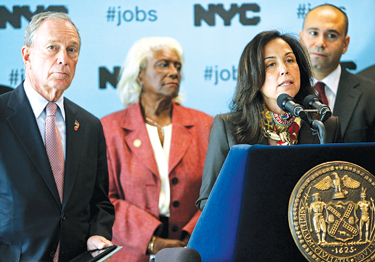New York City Mayor Michael R. Bloomberg was joined by elected officials and educational leaders on Oct. 15 at the launch of a state-of-the-art facility housing a Fordham-New York City initiative that supports Bronx entrepreneurship.

Photo by Bruce Gilbert
The collaboration between the city’s Department of Small Business Services (SBS) and Fordham’s Center for Entrepreneurship is housed in a facility located adjacent to Fordham’s Rose Hill campus, at 400 Fordham Road.
The 30,000-square-foot facility combines NYC Business Solutions services, Workforce1 Career Center services for job seekers, and the Fordham Foundry, at a single location. The foundry provides a collaborative space in which Fordham students, alumni, and staff, as well as other entrepreneurs, can launch small businesses.
The initiative’s main goals are:
• to support the Fordham community in developing and launching businesses;
• to create businesses that remain in the Bronx and spark economic growth and job creation; and
• to serve the greater Bronx community of entrepreneurs.
To help meet these goals, the center will provide SBS assistance by creating relevant courses for the Business Solutions center, offering monthly workshops to pitch opportunities, and developing a mentorship program in which Fordham faculty members offer one-on-one assistance to Fordham participants.
The University is contributing $25,000 towards a revolving loan fund for entrepreneurs trained in the foundry, as well as eligible SBS-referred businesses located in the Bronx.
“This partnership is our latest effort to leverage one of our economy’s strongest industries, to help us urge higher growth,” said Bloomberg.
“Universities are engines of innovation, as you know, and whether it is here or on Roosevelt Island or in downtown Brooklyn or upper Manhattan, they are helping us grow an economy for tomorrow. The more that entrepreneurs succeed here, the better off the Fordham neighborhood—and our entire city—will be.”
Donna Rapaccioli, Ph.D., dean of the Gabelli School of Business and dean of business faculty at Fordham, said there is great need in the Bronx for the kinds of skills Fordham can offer.
“We teach students that business has to be about more than making a profit,” she said. “We ask our students to think about how, and to come up with their own answers. We hope that, through the Gabelli School of Business curriculum, the answer they will discover is that business can—and should—change society and their own community for the better.”
“The Fordham Foundry has a world of potential to showcase this principle in action,” she continued. “Our focus is on creating and growing small business in the Bronx, on helping entrepreneurs who live here and who are dedicated to helping the Bronx.”
The Bloomberg administration has created several “business incubators,” such as the foundry, around the city as a means of encouraging startups by creating affordable, community-oriented workspaces for entrepreneurs.
“If there is one thing that Mayor Bloomberg understands, it is capital,” said Joseph M. McShane, S.J., president of Fordham. “In this case, he has wisely found a new way for Fordham to share its intellectual capital with the local community, and for the University to be enriched by the energy and imagination of the city’s most diverse borough.”
